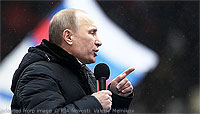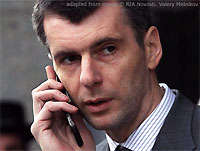Will Government Dialogue with Society Continue after Election Win?
Dmitry Babich - RIA Novosti - 3.6.12 - JRL 2012-43

While Vladimir Putin scored a decisive victory in the presidential election, the success of the opposition in some major cities was notable. The surprising third-place finish of the independent liberal candidate Mikhail Prokhorov is bigger news than the predictable second-place finish of Communist Party leader Gennady Zyuganov.
On Monday morning head of the Central Election Commission, Vladimir Churov, announced Putin the elected president: after 99.3% of the protocols were processed he had received 63.75% of votes.

file photo, adapted from
image at pravda.ru
Experts showed little interest in Zyuganov's runner-up finish, with his 17.19% coming from the same hardcore Communist base. Putin's coalition of voters is much broader than that of the United Russia party that nominated him, whereas Zyuganov is living off of the CPSU's faded glory. There were cases in the 1990s when the CPSU and Zyuganov received up to 32% of all votes, but that is a thing of the past.
Prokhorov's success is much more unexpected and interesting in terms of the underlying political science. It became clear by mid-night that he would take the bronze, ousting the perennial second runner-up Vladimir Zhirinovsky from the spot. In Moscow, Prokhorov made a strong second-place showing with 20.21% of the vote; Putin received 47.22%. In St. Petersburg, Prokhorov was backed by about 14% of voters.

Prokhorov beat out Zhirinovsky at the federal level 7.82% to 6.23% but Prokhorov's success in the capitals is the more telling statistic.
What conclusions do the election results suggest about the political alignment in the country? First, nobody will seriously dispute Putin's win. Only Zyuganov has not acknowledged election results so far, he has yet to concede and congratulate Putin, but this is mere ritual.
Significantly, Prokhorov, the hero of the day, refused to take the bait when the results can be questioned in the very first hours "And what about the millions of people who voted for me?" he asked in Vladimir Solovyev's show on the Rossiya television network.
The election has clarified an emerging, stark division in society. The "angry residents" of Moscow, other major cities and abroad (in London, Prokhorov crushed Putin) are not ready psychologically to acknowledge that the majority is right.
What can be done about this? What will the government do in this regard? Politics in post-Soviet Russia has been marked by a winner-take-all attitude. After the referendum in April 1993 and the presidential elections in 1996 and the early 2000s, the winners (that is, the government) acted as if there was no opposition in the country. The winners changed parliaments, appointed their own people to all government positions and carried out unpopular reforms.
It appears this political tradition has come to an end in Russia, just as in Ukraine where Yushchenko's success in 2005 did not lead to the political destruction of Viktor Yanukovych and the entire opposition though there were fears about this shortly after Yushchenko came to power. Russia also has the opportunity to gradually get used to coalitions, compromises and coordination of positions.
The public in Russia clearly wants dialogue. The members of the opposition, including Grigory Yavlinsky, who was barred from running in the presidential election, are talking more about local elections and party development than protests.
The votes for Prokhorov show that liberal protesters have changed their conduct. Instead of grumbling around the kitchen table or, in the case of the most extreme activists, doing battle with the police, they have decided to vote for the liberal candidate in the election. So far, only Sergei Udaltsov's Red Youth have vowed to fight for power. But in politics they now occupy the same scandalous niche as Eduard Limonov's National Bolsehviks before them.
Will the powers-that-be seek compromise? Will we have, heaven forbid, a coalition government? Will unpopular ministers resign at least? These would be steps in the right direction.
Putin has not yet said anything on this score. But even if the government does not make such moves, returning to the situation before December 2011 is hardly possible. There is no fear anymore ordinary people are no longer afraid to go to rallies, politicians are no longer afraid of voting "no" in the Duma. And this is as it should be.
Keywords: Russia, Government, Politics - Russia News - Russia

While Vladimir Putin scored a decisive victory in the presidential election, the success of the opposition in some major cities was notable. The surprising third-place finish of the independent liberal candidate Mikhail Prokhorov is bigger news than the predictable second-place finish of Communist Party leader Gennady Zyuganov.
On Monday morning head of the Central Election Commission, Vladimir Churov, announced Putin the elected president: after 99.3% of the protocols were processed he had received 63.75% of votes.

file photo, adapted from
image at pravda.ru
Experts showed little interest in Zyuganov's runner-up finish, with his 17.19% coming from the same hardcore Communist base. Putin's coalition of voters is much broader than that of the United Russia party that nominated him, whereas Zyuganov is living off of the CPSU's faded glory. There were cases in the 1990s when the CPSU and Zyuganov received up to 32% of all votes, but that is a thing of the past.
Prokhorov's success is much more unexpected and interesting in terms of the underlying political science. It became clear by mid-night that he would take the bronze, ousting the perennial second runner-up Vladimir Zhirinovsky from the spot. In Moscow, Prokhorov made a strong second-place showing with 20.21% of the vote; Putin received 47.22%. In St. Petersburg, Prokhorov was backed by about 14% of voters.

Prokhorov beat out Zhirinovsky at the federal level 7.82% to 6.23% but Prokhorov's success in the capitals is the more telling statistic.
What conclusions do the election results suggest about the political alignment in the country? First, nobody will seriously dispute Putin's win. Only Zyuganov has not acknowledged election results so far, he has yet to concede and congratulate Putin, but this is mere ritual.
Significantly, Prokhorov, the hero of the day, refused to take the bait when the results can be questioned in the very first hours "And what about the millions of people who voted for me?" he asked in Vladimir Solovyev's show on the Rossiya television network.
The election has clarified an emerging, stark division in society. The "angry residents" of Moscow, other major cities and abroad (in London, Prokhorov crushed Putin) are not ready psychologically to acknowledge that the majority is right.
What can be done about this? What will the government do in this regard? Politics in post-Soviet Russia has been marked by a winner-take-all attitude. After the referendum in April 1993 and the presidential elections in 1996 and the early 2000s, the winners (that is, the government) acted as if there was no opposition in the country. The winners changed parliaments, appointed their own people to all government positions and carried out unpopular reforms.
It appears this political tradition has come to an end in Russia, just as in Ukraine where Yushchenko's success in 2005 did not lead to the political destruction of Viktor Yanukovych and the entire opposition though there were fears about this shortly after Yushchenko came to power. Russia also has the opportunity to gradually get used to coalitions, compromises and coordination of positions.
The public in Russia clearly wants dialogue. The members of the opposition, including Grigory Yavlinsky, who was barred from running in the presidential election, are talking more about local elections and party development than protests.
The votes for Prokhorov show that liberal protesters have changed their conduct. Instead of grumbling around the kitchen table or, in the case of the most extreme activists, doing battle with the police, they have decided to vote for the liberal candidate in the election. So far, only Sergei Udaltsov's Red Youth have vowed to fight for power. But in politics they now occupy the same scandalous niche as Eduard Limonov's National Bolsehviks before them.
Will the powers-that-be seek compromise? Will we have, heaven forbid, a coalition government? Will unpopular ministers resign at least? These would be steps in the right direction.
Putin has not yet said anything on this score. But even if the government does not make such moves, returning to the situation before December 2011 is hardly possible. There is no fear anymore ordinary people are no longer afraid to go to rallies, politicians are no longer afraid of voting "no" in the Duma. And this is as it should be.